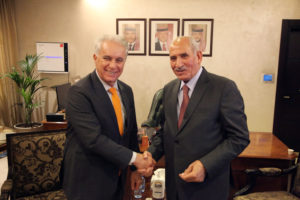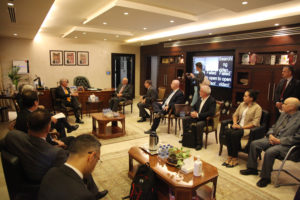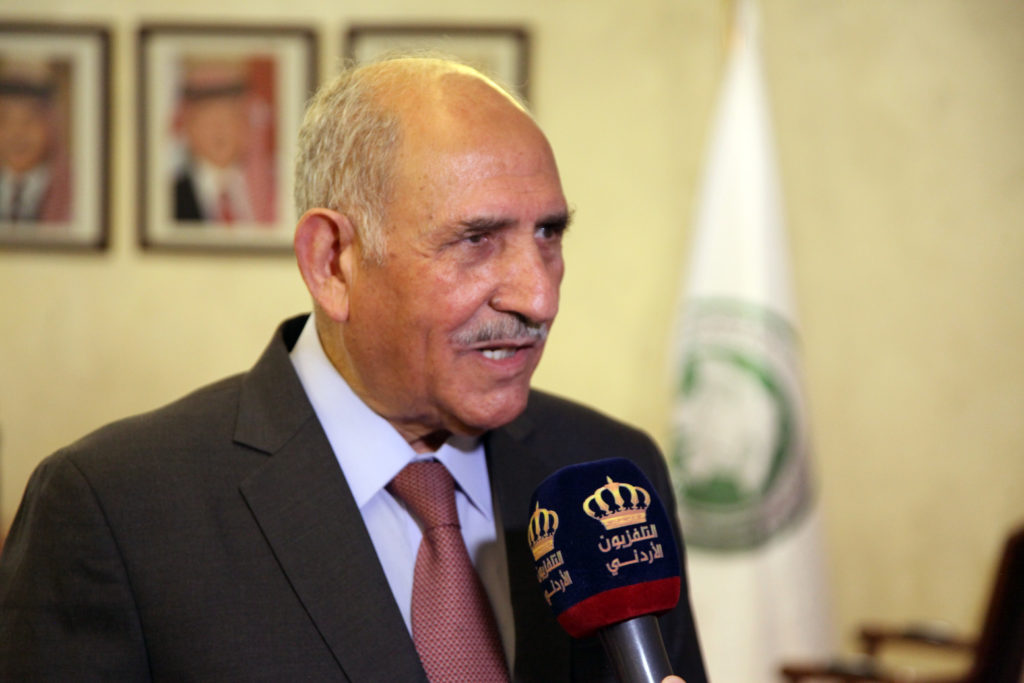Amman – The Jordan Phosphate Mines Company (JPMC) seeks to establish a joint venture with Brazilian investors to produce fertilizers, focusing on supplying the Brazilian market. The plan was presented this Sunday (8) by the company’s board chair, Mohammad Thneibat, to the Brazilian minister of Agriculture, Livestock, and Food Supply (MAPA), Marcos Montes, at a meeting in Amman, Jordan.

The minister is in the country with an agribusiness delegation to address the supply of fertilizers to Brazil. The Brazilian federal government has implemented the National Fertilizer Plan, through which it seeks alternatives to supply the sector. Brazil imports almost all the fertilizers it consumes, and the war involving Russia, an essential supplier in the sector, has been causing uncertainties concerning supply.
The visit to the JPMC was part of the mission’s schedule in Jordan – the group will also visit Egypt and Morocco. After welcoming the Brazilians at the company’s headquarters, Thneibat told ANBA the JPMC exports rock phosphate to Brazil, but in small quantities, though has the potential to sell much more to the South American country.
Thneibat said he was ready to invest a reasonable stake in a fertilizer plant with the Brazilians. The facility could be either in Jordan or in Brazil. The executive stated the company is willing to discuss all the possibilities and expects a Brazilian technical visit later this year to get a closer look at Jordan’s phosphate production.

According to Minister Marcos Montes, this project would serve the Brazilian market. “They have great potential but want to make a joint venture with a company or build a plant here or there (in Brazil) in partnership with them,” the minister told ANBA.
In Brazil, the federal government does not buy fertilizers or build private partnerships of this type. Still, the MAPA has been working towards bringing together different entities in the segment to ensure that agricultural production does not lack fertilizers, essential for the world’s food supply. At the meetings in Jordan, minister Montes called on Arab participants to be Brazil’s partners in food security, supplying the fertilizers the country needs to produce.
The Brazilian minister delegation – whose schedule is accompanied by the Brazilian ambassador to Jordan, Ruy Amaral – is made up of representatives from the private sector, sector associations, and government agencies, such as the Arab Brazilian Chamber of Commerce (ABCC), Brazilian Association of Animal Protein (ABPA), BRF, JBS, certifier Cdial Halal, Brazilian National Confederation of Agriculture and Livestock (CNA), Organization of Cooperatives of Brazil (OCB), Consolata Agroindustrial Cooperative (Copacol), Brazilian Agricultural Research Corporation (Embrapa), among others.
CNA: New models

One of Brazil’s National Fertilizer Plan guidelines is to increase domestic production. The assistant technical director of the CNA, Reginaldo Minaré, is following the mission and said even if the country increases production, imports are essential. “In the next 30 years, in the best case, we could be able to reduce by half our dependence (on imported fertilizers), which today is close to 90%, so we will still need a lot of fertilizer imports, and Jordan has the potential to be a promising supplier,” he told ANBA.
As a representative of Brazilian agribusiness, CNA takes part in the mission focusing on the central issue, which is fertilizers. Minaré informed the goal is also to find more business models, so farmers can import directly. Information obtained during the trip will be passed on to the productive sector and CNA-member agriculture and livestock federations.
After the meeting at JPMC’s headquarters, the Brazilian delegation was welcomed by the company’s executives and leaders for lunch, in which other representatives of the Jordanian fertilizer sector also participated, such as the Arab Potash Company (APC), the potash industry visited by the mission on Saturday (7).
This Sunday, the Brazilian delegation also visited Manaseer Group, which has the fertilizer and chemical sector among its activities. The Brazilian minister invited company representatives to present their technologies to producers in Brazil.
Here’s more on this:
Translated by Elúsio Brasileiro




